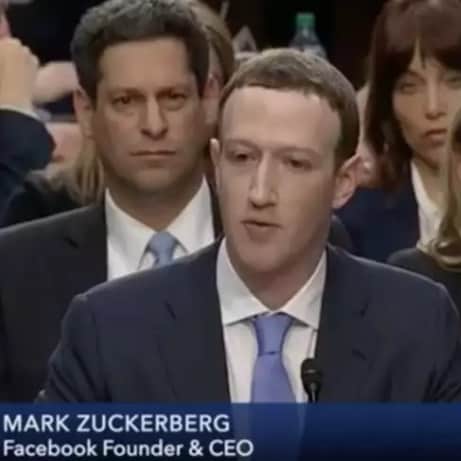Breaking up and Regulating Facebook: Unfair, Un-American, Unacceptable

 Facebook co-founder Chris Hughes, former publisher of The New Republic, argues in a long essay for The New York Times that the company should be broken up and regulated, and indeed that this would be the “American” thing to do. His essay is full of assertions, half-truths, and misrepresentations that together amount to a very weak case for action. Indeed, if his advice were to be followed we would be left with a very un-American outcome—strong and proactive regulation of individuals’ speech.
Facebook co-founder Chris Hughes, former publisher of The New Republic, argues in a long essay for The New York Times that the company should be broken up and regulated, and indeed that this would be the “American” thing to do. His essay is full of assertions, half-truths, and misrepresentations that together amount to a very weak case for action. Indeed, if his advice were to be followed we would be left with a very un-American outcome—strong and proactive regulation of individuals’ speech.
The essay starts not with a call for government action against Facebook, but against Mark Zuckerberg personally: “The government must hold Mark accountable.” In the absence of him having committed a crime, this is a call for unconstitutional action. The U.S. Constitution bars the government from passing laws directed at an individual—bills of attainder as they were known in the United Kingdom (CEI President Kent Lassman says more on this subject on Twitter.) The antitrust actions against the so-called (and misnamed) “Robber Barons” were directed at their companies, not at the magnates themselves. We should be very careful about making government action so personal.
Hughes goes on to laud those antitrust actions, presenting a one-sided view of American antitrust law and its evolution (he also misrepresents Adam Smith, who was concerned about monopolies because they were created by government, not the invisible hand). As Joe Kennedy of the Information Technology & Innovation Foundation explains, the law evolved the way it did because of a recognition that the approach Hughes champions was hurting consumers and businesses alike. What we now call the “consumer welfare standard” evolved to serve consumers and businesses better, ending the penalty for success that aggressive antitrust action represented. That is not to say the standard is perfect—Ryan Young and Wayne Crews outline a better way here—but it is certainly better than the interventionist approach Hughes prefers.
Is Facebook’s success leading to a decline in entrepreneurship, stalled productivity, and higher prices and fewer choices in digital communications, as Hughes insinuates? Almost certainly not. The example of Myspace that Hughes mentions shows how a dominant company can disappear almost overnight—and this has happened many times in the digital field in recent years. AOL, Yahoo (which wanted to buy Facebook), Nokia, and iTunes are a few of the mighty enterprises and business models that have been toppled in the last ten years—and that is despite their possession of vast amounts of user data.
What may be causing startups to sell out to Facebook and other companies is not those companies’ power, but financial regulation. With recent rules making it much more difficult to take a company to IPO, founders are looking to cash out by buyout rather than taking a company to the stock market early in its life. It is actually an important part of the exit strategy and business plan for entrepreneurs. Banning buyouts by big companies could well depress entrepreneurship as long as those financial rules are in place. Those regulations also discourage the investment in companies Hughes bemoans the lack of.
As for higher prices, most of the services Hughes is complaining about are free. Moreover, competition is rampant between big tech companies. Facebook’s Portal is competing directly with Amazon and Google in the family communication business, for instance. Only in social media is Facebook clearly the most popular choice, but its market share dropped from 76% to 66% globally in 2018. The latest figures suggest that Pinterest is now a genuine competitor to Facebook in the U.S. It should be noted that the usage statistics Hughes cites date from January 2018.
What about Vine and Snapchat? Hughes says that Facebook killed one and copied the other. Yet investigations into why Vine failed do not highlight Facebook’s decision that Hughes says was the reason. It is certain that Facebook copied Snapchat’s basic idea, but that has happened many times before in American business and will happen many times again. U.S. patent law rightly does not protect abstract concepts—a point Hughes concedes.
Hughes does make a valid point that Mark Zuckerberg’s call for more regulation of social media may be an attempt to head off aggressive antitrust action. We agree. However, that does not necessarily mean more regulation than Mr. Zuckerberg has called for is the answer. When Hughes says that government regulation “makes a dynamic and fair market possible” in air travel and pharmaceuticals, he has missed the goal by a wide margin. Air travel was so badly regulated that it was deregulated by the Carter administration. As for pharmaceuticals, we know that the Food and Drug Administration needs to pay more attention to evidence, resist external influence and internal dogma, and pay more respect to individual choice. All of these failings make a dynamic and fair market much less likely.
The remedy Hughes suggests for all of the supposed failings isn’t fines, such as the Federal Trade Commission is proposing and the European Union likes to impose, but breakup. As Will Rinehart of the American Action forum wrote recently in The Wall Street Journal, this is far easier said than done. He points out several issues specific to Facebook:
Google and Facebook rely on flexible teams that cross the normal divisional boundaries to solve problems. These multipurpose teams drive their firms’ productivity; breaking them apart would risk killing the golden goose. By encouraging coordination among their internal departments, the tech titans have developed complex and constantly shifting organizational webs. This structure would frustrate any Standard Oil-style trustbusting effort because there are so few natural breaks within the companies. Splitting up these firms would require government officials to go cubicle by cubicle—a difficult and draconian move.
Trustbusting would also require breaking up the companies’ technologies. Facebook has developed its own suite of software to address unique problems dealing with vast troves of data: BigPipe to load pages faster, Haystack to store photos efficiently, and Unicorn to search its social data, among others.
As he notes, the result of bureaucrats breaking apart carefully-crafted corporate structures would be destruction in value not just for the companies (including the successor companies) and their shareholders, but for consumers.
Yet Hughes goes much further than just advocating breakup. He advocates a regulator for government control of speech:
[T]he agency should create guidelines for acceptable speech on social media. This idea may seem un-American — we would never stand for a government agency censoring speech. But we already have limits on yelling “fire” in a crowded theater, child pornography, speech intended to provoke violence and false statements to manipulate stock prices. We will have to create similar standards that tech companies can use. These standards should of course be subject to the review of the courts, just as any other limits on speech are. But there is no constitutional right to harass others or live-stream violence.
The reason it seems un-American is because it is un-American. We emphatically do not have limits on yelling “fire” in a crowded theater, despite the widespread belief that we do—and the phrase was actually deployed to justify now-overturned odious restrictions on speech. The other examples Hughes uses are all speech related to illegal acts. Hughes would expand these to cover much broader areas. Would bans on live-streaming of violence encompass live coverage of a war or riot, for instance? And expansive definitions of “harassment” or trolling have been used in even countries with strong traditions of free speech like the United Kingdom to criminalize bad jokes. The First Amendment gives such strong protection to Americans’ speech that anything like what Hughes suggests (a speech regulator) is likely to be unconstitutional.
In short, Hughes’ suggestions would be unfair to Mark Zuckerberg and his company, un-American in their disregard for evolving law and the constitution, and unacceptable to those who believe in a free society.